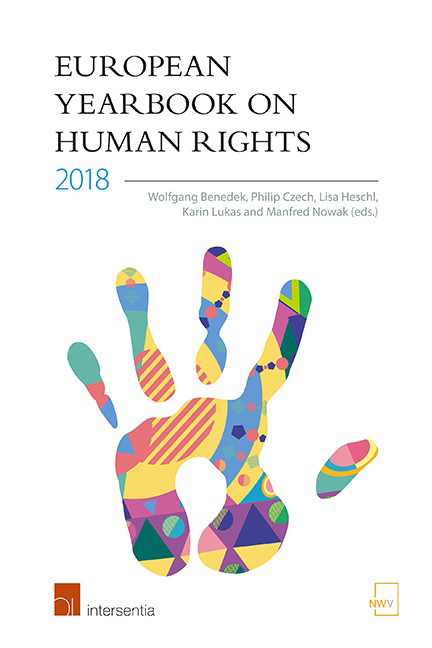Book contents
- Frontmatter
- Scientific Advisory Board
- Editors’ Preface
- Contents
- List of Abbreviations
- List of Contributors
- Part I Topic Of The Year
- Part II Eu
- Part III Coe
- PART IV OSCE
- Enhanced Structure and Geographical Balance: Reforming the OSCE's Human Dimension Meetings
- The Crisis of the International Protection of Human Rights and the Geopolitical OSCE Perspective: ‘The End of Human Rights’, ‘Shooting the Messenger’ or Strengthening Cooperation?
- How Multilateral Organisations can Communicate Better about Human Rights
- Rising Populism and its Impact on Women's Rights: Selected Cases from the OSCE Region
- The Impact of #MeToo on Women's Rights in the OSCE Region
- Part V Others
- Part VI Book Reviews
- Index
The Crisis of the International Protection of Human Rights and the Geopolitical OSCE Perspective: ‘The End of Human Rights’, ‘Shooting the Messenger’ or Strengthening Cooperation?
from PART IV - OSCE
Published online by Cambridge University Press: 31 January 2019
- Frontmatter
- Scientific Advisory Board
- Editors’ Preface
- Contents
- List of Abbreviations
- List of Contributors
- Part I Topic Of The Year
- Part II Eu
- Part III Coe
- PART IV OSCE
- Enhanced Structure and Geographical Balance: Reforming the OSCE's Human Dimension Meetings
- The Crisis of the International Protection of Human Rights and the Geopolitical OSCE Perspective: ‘The End of Human Rights’, ‘Shooting the Messenger’ or Strengthening Cooperation?
- How Multilateral Organisations can Communicate Better about Human Rights
- Rising Populism and its Impact on Women's Rights: Selected Cases from the OSCE Region
- The Impact of #MeToo on Women's Rights in the OSCE Region
- Part V Others
- Part VI Book Reviews
- Index
Summary
ABSTRACT
‘ The end of human rights? ‘ as a question against the background of the current geopolitical situation can be examined particularly well from the Organization for Security and Cooperation in Europe (OSCE) perspective–human rights, democracy and the rule of law have been established as key elements of a comprehensive security concept in the framework of the world‘s largest regional security organisation. The ‘ return of geopolitics ‘ and the current crisis of the protection human rights results in a shrinking space especially for human rights defenders, non-governmental organisations (NGOs), and journalists, who are being targeted as carriers of a message of obligations and accountability. Austria‘s Chairmanship of the OSCE in 2017 has been affected in a number of ways by this situation but was brought to a relatively positive conclusion. In order to not only protect the messenger, but also the message, the year 2018 offers a special opportunity to strengthen the international human rights movement against the background of the 70th anniversary of the Universal Declaration of Human Rights and the 25th anniversary of the Vienna World Conference on Human Rights.
INTRODUCTION
‘ The End of Human Rights? ‘–when a US periodical, specialised on foreign affairs, puts human rights on its cover, this is quite unusual in itself. It is even more unusual when it is done in this manner, implying a danger or even an end because of the current US administration‘s policies, breaking from decades of declared priorities. Following this implication, however, would mean to both under- and overestimate the importance of a US-centric perspective–the crisis has been developing over a number of years: its reasons are multifaceted, and it is not ‘ human rights ‘ as such which are concerned, of course, but rather their protection, especially at the interface between the national level and multinational protection mechanisms. Where this becomes most visible, and urgent, is growing efforts trying to control the message, and the messenger, especially the messenger of criticism, be it human rights defenders and nongovernmental organisations (NGOs), journalists or international institutions.
- Type
- Chapter
- Information
- European Yearbook on Human Rights 2018 , pp. 481 - 494Publisher: IntersentiaPrint publication year: 2018



